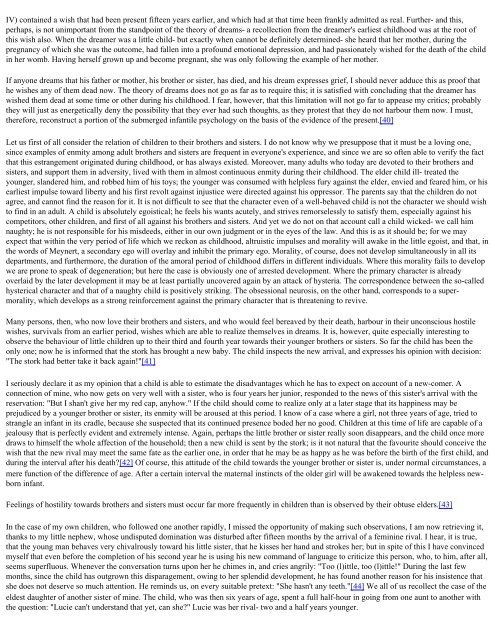The Interpretation of Dreams Sigmund Freud (1900)
The Interpretation of Dreams Sigmund Freud (1900)
The Interpretation of Dreams Sigmund Freud (1900)
You also want an ePaper? Increase the reach of your titles
YUMPU automatically turns print PDFs into web optimized ePapers that Google loves.
IV) contained a wish that had been present fifteen years earlier, and which had at that time been frankly admitted as real. Further- and this,<br />
perhaps, is not unimportant from the standpoint <strong>of</strong> the theory <strong>of</strong> dreams- a recollection from the dreamer's earliest childhood was at the root <strong>of</strong><br />
this wish also. When the dreamer was a little child- but exactly when cannot be definitely determined- she heard that her mother, during the<br />
pregnancy <strong>of</strong> which she was the outcome, had fallen into a pr<strong>of</strong>ound emotional depression, and had passionately wished for the death <strong>of</strong> the child<br />
in her womb. Having herself grown up and become pregnant, she was only following the example <strong>of</strong> her mother.<br />
If anyone dreams that his father or mother, his brother or sister, has died, and his dream expresses grief, I should never adduce this as pro<strong>of</strong> that<br />
he wishes any <strong>of</strong> them dead now. <strong>The</strong> theory <strong>of</strong> dreams does not go as far as to require this; it is satisfied with concluding that the dreamer has<br />
wished them dead at some time or other during his childhood. I fear, however, that this limitation will not go far to appease my critics; probably<br />
they will just as energetically deny the possibility that they ever had such thoughts, as they protest that they do not harbour them now. I must,<br />
therefore, reconstruct a portion <strong>of</strong> the submerged infantile psychology on the basis <strong>of</strong> the evidence <strong>of</strong> the present.[40]<br />
Let us first <strong>of</strong> all consider the relation <strong>of</strong> children to their brothers and sisters. I do not know why we presuppose that it must be a loving one,<br />
since examples <strong>of</strong> enmity among adult brothers and sisters are frequent in everyone's experience, and since we are so <strong>of</strong>ten able to verify the fact<br />
that this estrangement originated during childhood, or has always existed. Moreover, many adults who today are devoted to their brothers and<br />
sisters, and support them in adversity, lived with them in almost continuous enmity during their childhood. <strong>The</strong> elder child ill- treated the<br />
younger, slandered him, and robbed him <strong>of</strong> his toys; the younger was consumed with helpless fury against the elder, envied and feared him, or his<br />
earliest impulse toward liberty and his first revolt against injustice were directed against his oppressor. <strong>The</strong> parents say that the children do not<br />
agree, and cannot find the reason for it. It is not difficult to see that the character even <strong>of</strong> a well-behaved child is not the character we should wish<br />
to find in an adult. A child is absolutely egoistical; he feels his wants acutely, and strives remorselessly to satisfy them, especially against his<br />
competitors, other children, and first <strong>of</strong> all against his brothers and sisters. And yet we do not on that account call a child wicked- we call him<br />
naughty; he is not responsible for his misdeeds, either in our own judgment or in the eyes <strong>of</strong> the law. And this is as it should be; for we may<br />
expect that within the very period <strong>of</strong> life which we reckon as childhood, altruistic impulses and morality will awake in the little egoist, and that, in<br />
the words <strong>of</strong> Meynert, a secondary ego will overlay and inhibit the primary ego. Morality, <strong>of</strong> course, does not develop simultaneously in all its<br />
departments, and furthermore, the duration <strong>of</strong> the amoral period <strong>of</strong> childhood differs in different individuals. Where this morality fails to develop<br />
we are prone to speak <strong>of</strong> degeneration; but here the case is obviously one <strong>of</strong> arrested development. Where the primary character is already<br />
overlaid by the later development it may be at least partially uncovered again by an attack <strong>of</strong> hysteria. <strong>The</strong> correspondence between the so-called<br />
hysterical character and that <strong>of</strong> a naughty child is positively striking. <strong>The</strong> obsessional neurosis, on the other hand, corresponds to a supermorality,<br />
which develops as a strong reinforcement against the primary character that is threatening to revive.<br />
Many persons, then, who now love their brothers and sisters, and who would feel bereaved by their death, harbour in their unconscious hostile<br />
wishes, survivals from an earlier period, wishes which are able to realize themselves in dreams. It is, however, quite especially interesting to<br />
observe the behaviour <strong>of</strong> little children up to their third and fourth year towards their younger brothers or sisters. So far the child has been the<br />
only one; now he is informed that the stork has brought a new baby. <strong>The</strong> child inspects the new arrival, and expresses his opinion with decision:<br />
"<strong>The</strong> stork had better take it back again!"[41]<br />
I seriously declare it as my opinion that a child is able to estimate the disadvantages which he has to expect on account <strong>of</strong> a new-comer. A<br />
connection <strong>of</strong> mine, who now gets on very well with a sister, who is four years her junior, responded to the news <strong>of</strong> this sister's arrival with the<br />
reservation: "But I shan't give her my red cap, anyhow." If the child should come to realize only at a later stage that its happiness may be<br />
prejudiced by a younger brother or sister, its enmity will be aroused at this period. I know <strong>of</strong> a case where a girl, not three years <strong>of</strong> age, tried to<br />
strangle an infant in its cradle, because she suspected that its continued presence boded her no good. Children at this time <strong>of</strong> life are capable <strong>of</strong> a<br />
jealousy that is perfectly evident and extremely intense. Again, perhaps the little brother or sister really soon disappears, and the child once more<br />
draws to himself the whole affection <strong>of</strong> the household; then a new child is sent by the stork; is it not natural that the favourite should conceive the<br />
wish that the new rival may meet the same fate as the earlier one, in order that he may be as happy as he was before the birth <strong>of</strong> the first child, and<br />
during the interval after his death?[42] Of course, this attitude <strong>of</strong> the child towards the younger brother or sister is, under normal circumstances, a<br />
mere function <strong>of</strong> the difference <strong>of</strong> age. After a certain interval the maternal instincts <strong>of</strong> the older girl will be awakened towards the helpless newborn<br />
infant.<br />
Feelings <strong>of</strong> hostility towards brothers and sisters must occur far more frequently in children than is observed by their obtuse elders.[43]<br />
In the case <strong>of</strong> my own children, who followed one another rapidly, I missed the opportunity <strong>of</strong> making such observations, I am now retrieving it,<br />
thanks to my little nephew, whose undisputed domination was disturbed after fifteen months by the arrival <strong>of</strong> a feminine rival. I hear, it is true,<br />
that the young man behaves very chivalrously toward his little sister, that he kisses her hand and strokes her; but in spite <strong>of</strong> this I have convinced<br />
myself that even before the completion <strong>of</strong> his second year he is using his new command <strong>of</strong> language to criticize this person, who, to him, after all,<br />
seems superfluous. Whenever the conversation turns upon her he chimes in, and cries angrily: "Too (l)ittle, too (l)ittle!" During the last few<br />
months, since the child has outgrown this disparagement, owing to her splendid development, he has found another reason for his insistence that<br />
she does not deserve so much attention. He reminds us, on every suitable pretext: "She hasn't any teeth."[44] We all <strong>of</strong> us recollect the case <strong>of</strong> the<br />
eldest daughter <strong>of</strong> another sister <strong>of</strong> mine. <strong>The</strong> child, who was then six years <strong>of</strong> age, spent a full half-hour in going from one aunt to another with<br />
the question: "Lucie can't understand that yet, can she?" Lucie was her rival- two and a half years younger.









